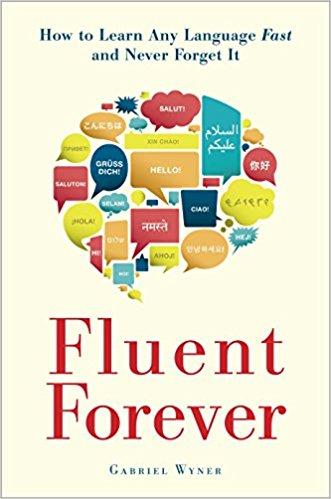Fluent Forever Summary
5 min read ⌚
 How to Learn Any Language Fast and Never Forget It
How to Learn Any Language Fast and Never Forget It
Do you want to start learning a new language? Have you started, but given up countless times?
In our summary of “Fluent Forever,” we present you the secrets of getting the most of your memory, along with the precise techniques you can use for a smoother language learning process.
We promise you will learn a few tricks that you will surely find useful tips that will make remembering all those problematic words and grammar rules a piece of cake.
Who Should Read “Fluent Forever”? and Why?
Why is learning a new language so tricky?
You have to struggle with remembering new words, grammar rules and their exceptions, and strange rhythm and pronunciation.
“Fluent Forever” is a book that promises to erase all those difficulties, by linking neuroscience with tricks on memory.
We recommend this book to all people out there who are learning a new language, and everyone who could use some techniques to improve their memory.
About Gabriel Wyner
 Gabriel Wyner is a polyglot who has learned German, French, and Russian fluently in just a few months each, using his techniques for rapid language learning. He currently works on learning Japanese and Hungarian.
Gabriel Wyner is a polyglot who has learned German, French, and Russian fluently in just a few months each, using his techniques for rapid language learning. He currently works on learning Japanese and Hungarian.
He also holds degrees in vocal arts and engineering.
“Fluent Forever Summary”
If you have ever tried to learn a new language, then you probably know how hard it may be.
Just think of all those new words you believe you just learned, and then a minute later – you realize you forgot.
We have some good news for you!
There are some techniques you can learn that can help you make these new words to stick.
One of those techniques is making connections in your mind.
You need to know that although all connections can help you remembering, some are more effective than others.
Now, the brain processes word a few different levels: personal connection, structure, sound, concept. The most effective connection you can make is linking a word to personal experience.
Let’s take an example.
Let’s say you want to learn the French word for cat.
If you can manage to connect the word to a memory you have with a cat, you will double your chances of remembering it.
Visual memory is a fantastic tool that you can use in remembering just about everything.
Read on to find out the precise techniques that you can use to make the remembering process more efficient.
Key Lessons from “Fluent Forever”:
1. The Truth about Memory
2. Word Games
3. Speeding up Your Progress
The Truth about Memory
You have heard that repetition is the mother of knowledge, but how true is that?
In the nineteenth century, German psychologist Hermann Ebbinghaus devoted several years of his life to memorizing a list of nonsensical syllables. He then compared the time it took him to learn the list of the time it took him to relearn the same list. What he got, as a result, was the forgetting curve.
In other words, he found out that you remember about 30 percent of what you learn a day later, but only 10 percent after a year.
The truth is your memory is worse than you think and increasing repetition is not the best way. Repeating the information is overlearning, and studies show that it is not useful when it comes to long-term memory.
If learning like we have been learning so far is not right, then what can we do?
Well, we can use the act called recalling. Find out more about remembering the pages of “Fluent Forever.”
Now, we move to our second lesson.
Word Games
- Spot The Difference
What you need for this game are Google images. Search for any word, and you will get a bunch of pictures that will not only show you one example of what the word means but all the subtleties of it.
By spotting the difference between what is on the screen and what you expected to see will let you note the various meanings of the word, and make words easier to learn.
- Memory Game
Take a word you want to learn and connect it to something personal.
Do not worry, even if you are unable to find a connection, you will still remember the word by the action of searching for a linkage.
Fill your brain with comprehensible input, and you will have no problem at all.
- PAO Technique
Word conjugations and all those nouns, adjectives and verbs that come in different forms are the most challenging part of learning a language. There are rules, but there are also so many expectations to them!
Now, you may believe that the only way to learn these words are remembering endless lists of endings.
However, we have a better idea.
When you try to learn a word, create a simple, personal story for it by employing the person-action-object (PAO) technique, which you will learn more about in the book.
Speeding up Your Progress
- Use monolingual dictionaries
Monolingual dictionaries are dictionaries in which the words’ meanings are explained using the same language as the language you are learning and the words you looked up for. This builds vocabulary much faster.
- Abstain from constant translations
Whenever we start learning a new language, we always try to translate all words into our native language to understand their exact meanings.
Although this seems intuitive and sensible, if you want to speed up your progress, you need to stop the need to translate everything.
You can do this with the monolingual dictionaries, by removing the subtitles from the movies you watch, et cetera.
Try reading a book while listening to its audio version.
This will teach you the rhytm of the new language.
Like this summary? We’d Like to invite you to download our free 12 min app, for more amazing summaries and audiobooks.
“Fluent Forever” Quotes
If you talk to a man in a language he understands, that goes to his head. If you talk to him in his language, that goes to his heart. —Nelson Mandela Share on X Our capacity for visual memory is extraordinary; we only need to learn how to take advantage of it. Share on X The difference between false memories and true ones is the same as for jewels: it is always the false ones that look the most real, the most brilliant. —Salvador Dalí Share on X Extra repetition is known as overlearning, and it doesn’t help long-term memory at all. Can you remember a single fact from the last school test you crammed for? Can you even remember the test itself? If we’re going to invest our time in… Share on X The difference between false memories and true ones is the same as for jewels: it is always the false ones that look the most real, the most brilliant. —Salvador Dal Share on XOur Critical Review
In “Fluent Forever” Wyner lets readers know the tips and tricks that enabled him to learn a few languages in a few months each. As a result learning, a new language turns from being a struggle into being a fun game.
Emir is the Head of Marketing at 12min. In his spare time, he loves to meditate and play soccer.


 How to Learn Any Language Fast and Never Forget It
How to Learn Any Language Fast and Never Forget It




